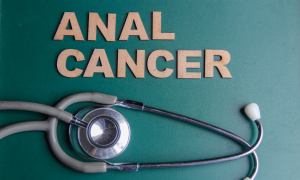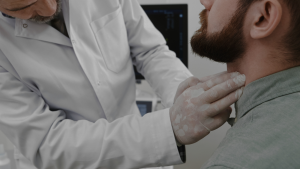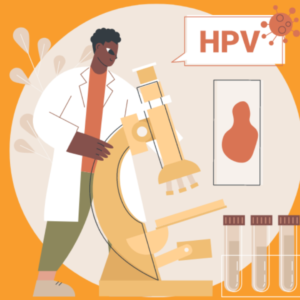
HPV-Related Head and Neck Cancer
You have probably heard that HPV can cause cervical cancer. But did you know that it can also cause cancers of the mouth, tongue, and throat?
In ASHA’s 2022 survey of 1,040 men in the U.S., only 31% of respondents knew that HPV can cause anal and penile cancer and even fewer (23%) knew that HPV can cause oral/throat cancer.
We know that one important way to raise awareness about HPV-related cancer in men is by sharing stories of those who have experienced it. For patients diagnosed with cancer and survivors, stories from others who have been through the same experience can be a source of comfort, support, and possibly guidance on how to manage the experience. For spouses and family members, such stories can offer a window into the world of their loved ones. Healthcare providers also benefit from the insight offered by patients—insights they may not otherwise hear.
Below we share stories from three men on their experiences with HPV-related cancer.
Before my diagnosis, as a health care provider, I knew about HPV and HPV-related cancer. I had some level of understanding of HPV related throat cancer, largely through news stories about Michael Douglas and others.
I had an advantage of having a university-based health care team, with a wide degree of support and knowledge. The “team” approach was great, with well-experienced doctors training new doctors, nurse coordinators making sure appointments were coordinated, and mental health counselors supporting beyond the physical challenge of this diagnosis.
I read more about HPV-related cancer by speaking in great detail with my health care team. I supplemented that by doing some online research through reputable websites.
My wife and I had an agreement that we would not go “down the rabbit hole” by looking at information online that wasn’t scientific-based. In other words, “hearsay” evidence (people describing their own knowledge of something based on something they think or heard) isn’t as reliable as scientific, research-based evidence.
From my perspective, as a doctor myself, the best support you can give a patient is to LISTEN to them. Yes, my doctor may have seen this many times and it may seem like “old hat” to them, but it’s my first cancer diagnosis, so I have plenty of questions and need plenty of information and compassion. Treat the patient, not just their cancer.
Don’t offer advice that’s contrary to what professionals are offering. It’s OK to question professional advice, but well-meaning, but ill-informed, advice often isn’t helpful. Family members and caregivers can be the biggest source of emotional support, because they know you the best. Remember that cancer patients sometimes have some pretty bad days. Be patient, be kind, be compassionate.
I’ve actually lost some close friends after my cancer diagnosis. While painful, I recognized that not all people are up for this journey. That my own cancer may remind them of very sad times in their lives when perhaps a parent suffered from a different cancer.
Cancer is a test for the patient, and a test for your relationships, too. For me, my family supported me much more than I thought they would, and we are all closer as a result. But I did lose some friends along the way who just couldn’t deal with the challenge. That’s OK with me. People can be like parachutes sometimes – if they’re not there for you when you need them, you’re not likely to need them again.
I was diagnosed with Stage IV HPV+OPSCC in May 2023. After going through radiation treatment and chemotherapy, I had a follow-up PET scan, along with other testing, in early December 2023, when I was declared cancer-free (or at least as “cancer-free” as the doctors can state with relative certainty).
I’ve been left with several side effects—dry mouth (which likely will be long-term and generally permanent), loss of taste (which is slowly returning and I’ve been told can take many, many months), and neurological damage to my lower cervical spine and brachial plexus. It remains to be seen how much that neurological damage improves, as nerve damage generally takes the longest to recover.
Overall, I consider myself pretty lucky. I never lost my voice. My hair returned. I was able to avoid other, more significant, permanent side effects that other OPSCC patients suffer from. And I’m cancer-free!
Don’t get too far ahead of yourself. It’s easy to think about what “could” happen, especially with cancer. For me, it helped to just take each step as they came.
I’d also strongly suggest that you speak up and advocate for yourself if you don’t feel like you are getting the right kind of care. You deserve to be treated with respect and competence!
Yes, I’m a virologist by training but was unaware that HPV caused head and neck cancers until I was diagnosed with stage 3 metastatic tonsil cancer with 2 lymph nodes involved.
The openness and honesty of my referring and treating ENTs.
Doing research on the internet and reading scientific articles on the subject.
Be open and honest with your patients and refer them to organizations like the Head and Neck Cancer Alliance, who provide support groups and webinars on caregiving, treatments, and post-treatment support.
Be present in the moment and don’t feel guilty that you cannot do anything for your family member or friend.
The hardest part of my journey has been dealing with my recurrent metastatic diagnosis—stage 4 incurable metastatic oropharyngeal squamous cell carcinoma with spread to my skeletal system and lungs.
This was supposed to be a highly curable, highly survivable cancer but it turns out mine is super aggressive, and my immune system didn’t respond appropriately to the initial tumors. This has allowed the cancer to hide and recur in a metastatic fashion.
I’m currently undergoing second-line chemotherapy treatments to slow the progression of my cancer while I try and enroll in a clinical trial.
It’s okay to cry. It’s okay to ask for help. Your friends will support you.
After his diagnosis with HPV-related oral cancer, Jason Mendelsohn gave himself the moniker SupermanHPV to help draw attention to the diagnosis, and help me spread the word about HPV related oral cancer. Listen as Jason shares his experiences as a patient with stage 4 HPV-related tonsil cancer – chemo, radiation, surgery, and a crash course in dealing with a head and neck tumor – along with his advice for patients and caregivers.

You have probably heard that HPV can cause cervical cancer. But did you know that it can also cause cancers of the mouth, tongue, and throat?

There are over 100 different types of human papillomavirus, or HPV. Some types of HPV can cause genital warts and other types can cause cancer, including cancer of the cervix, vulva, vagina, penis or anus, as well as cancer in the back of the throat.

It can be difficult to talk to family and friends about any cancer diagnosis. It can be helpful to have a team of friends and family for support, but you are in charge of who you tell and how much you tell them.

Anal cancer is a rare cancer, but cases have been on the rise in recent years. Dr. Joel Palefsky answers questions on anal cancer screening and the recent ANCHOR trial.

HPV-related throat cancer is now the most common HPV-related cancer in the U.S. Learn more about symptoms, treatment, and prevention from D r. Michael Moore.

About 4 out of 10 HPV-related cancers occur in men, which means that about 15,000 men get cancers caused by HPV each year.

HPV (a.k.a. human papilloma virus) is an equal opportunity virus, infecting both men and women. Men can get infected with HPV, and most do—it’s so common that nearly all sexually active people will have HPV at some point in
their lives.
ASHA believes that all people have the right to the information and services that will help them to have optimum sexual health. We envision a time when stigma is no longer associated with sexual health and our nation is united in its belief that sexuality is a normal, healthy, and positive aspect of human life.
ABOUT
GET INVOLVED
ASHA WEBSITES
GET HELP
© 2026 American Sexual Health Association